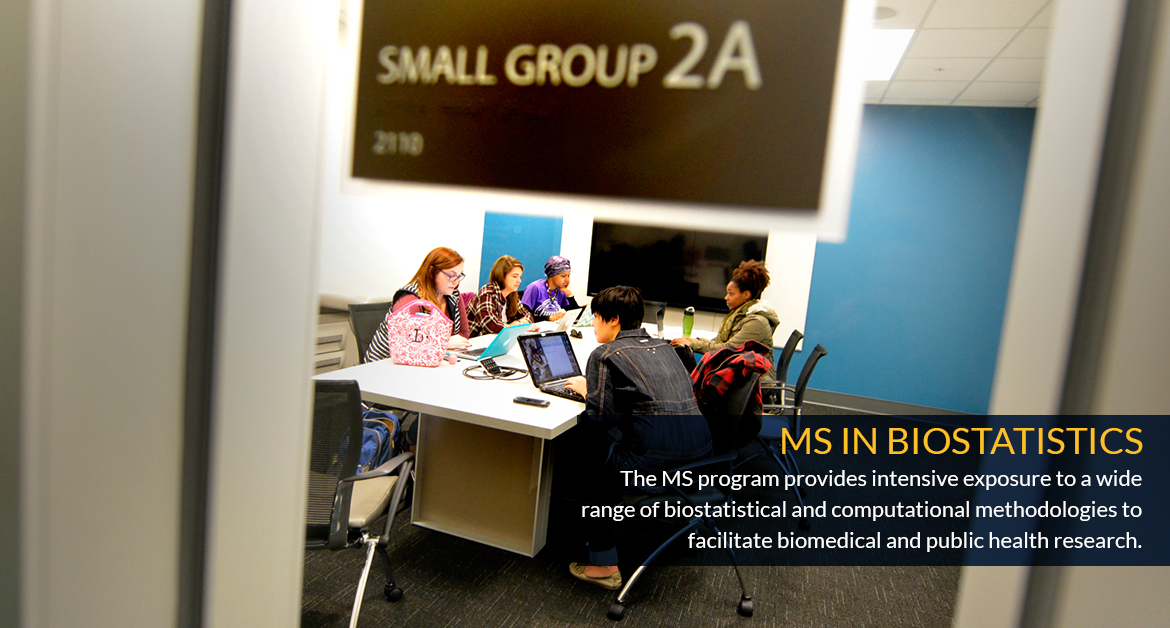
The Master of Science (MS) degree in Biostatistics provides individuals with rigorous training in statistical methodology in order to prepare them for careers as biostatisticians to collaborate with and provide statistical support to scientists and researchers in biomedical, health sciences and other related areas of research.
The M.S. program provides an intensive exposure to the wide range of methodologies and techniques needed to function and excel as a biostatistician, with expertise in designing data collection for experiments, observational studies, and clinical trials, extracting information stored in various forms, and analyzing, reporting and presenting the findings.
The MS program curriculum includes
Didactic coursework
Check out a complete sample list of the courses and course descriptions.
|
Year |
Fall |
Spring |
Summer |
|
Year 1 |
STAT 7110 – Statistical Models and Methods (3) DATS 7510 –Programming for Data Analysis (3) STAT 7520 – Stat Theory I (3) STAT 7520 – Stat Theory I (3) |
STAT 7620 – Stat Theory II (3) STAT 7630 – Applied Linear Models (3) Elective (3) |
No summer courses are required. Enrolling in Stat 8890 RR (1-6) is optional. Year: 15 hrs core, 3 hrs elective |
|
Year 2 |
STAT 7640 – Generalized Linear Models I (3) STAT 7720 Survival Analysis (3) STAT 7870 – Biostat Consulting in research (3) MS Comp beginning of the semester. Consulting Project or Thesis Research proposal due 5 weeks before final of fall. |
Elective (3) Elective (3) STAT 7910 – Biostat Consulting Project (3) or STAT 7920 – Thesis Research (3) |
No summer courses are required. Enrolling in Stat 8890 RR (1-6) is optional. Year: 9 hrs core, 6 hrs elective, 3 hrs MS Project or Thesis
|
List of possible elective courses for MS students:
STAT 7130 Intro to Epidemiology 3 CR
STAT 7240 Introduction to Clinical Trials 3 CR
STAT 7260 Design and Analysis of Observational Studies 3 CR
STAT 7350 Epidemic Modeling 3 CR
STAT 7360 Systematic Reviews 3 CR
STAT 7370 Intermediate Epidemiology 3 CR
STAT 7650 Introduction to Stochastic Processes 3 CR
STAT 7750 Introduction to Statistical Genomics 3 CR
STAT 7850 Omics Data Analysis 3 CR
STAT 7880 Special Topics 1-3 CR
STAT 9120 Theory of Linear Models 3 CR
STAT 9140 Generalized Linear Models II 3 CR
STAT 8150 Advanced Statistical Methods in Genetic Analysis I 3 CR
STAT 8160 Analysis of Clustered and Correlated Data 3 CR
DATS 8170 Advanced Computational Methods 3 CR
STAT 9220 Advanced Statistical Inference 3 CR
STAT 8231 Nonparametric & Robust Statistical Methods 3 CR
STAT 9240 Bayesian Inference 3 CR
STAT 8270 Computational Genomics & Proteomics 3 CR
STAT 9280 Advanced Special Topics 1-3 CR
DATS 7860 Statistical and Machine Learning for Big Data 3 CR
For more information on the course pre-requisites and other requirements for applying to the MS program in Biostatistics, see our Prospective Students page.